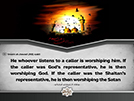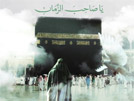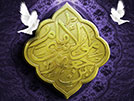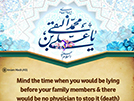Letter 86
- Details
- Hits: 4023
Letter 86
I Thursday's Calamity,
II The Reason Why the Prophet Repealed His Order Then.
Rabi`ul-Awwal 8, 1330
1) The incidents in which they did not follow the texts of hadith are innumerable. Take, for example, the calamity on Thursday, which is the most famous of such incidents and the most abominable among them. It is narrated by all authors of sahihs and sunan, and it was documented by all traditionists and historians. Suffices you what al-Bukhari, in his section dealing with the statement of the ailing Messenger (pbuh): "Get away from me," on page 5, Vol. 4, of his Sahih, where the author relies on the authority of `Ubaydullah ibn Abdullah ibn `Utbah ibn Mas`ud who quotes Ibn `Abbas saying that when death approached the Messenger of Allah, peace be upon him and his progeny, his house was full of men including `Umer ibn al-Khattab. The Messenger of Allah, peace be upon him and his progeny, said: "Let me write you something that will forever protect you against straying after me." `Umer said: "The Prophet is under the influence of pain, and you have with you the Qur'an; so, the Book of Allah suffices us." Those who were present there argued among themselves, and their argument developed into a dispute. Some of them said: "Come close to the Prophet so that he may write something for you that will safeguard you against straying after him," while others repeated what `Umer had said. When the argument and dispute intensified in the presence of the Prophet, the Messenger of Allah, peace be upon him and his progeny, said to them: "Get away from me." Ibn `Abbas used to say: "The calamity, the real calamity, is what caused the Messenger of Allah (pbuh) to desist from writing what he wished to write, due to their argument and dispute."
There is no dispute regarding the authenticity of this hadith nor the occasion whereupon it was invoked. Al-Bukhari quotes it in his treatise on knowledge on page 22, Vol. 1, of his work, and it exists in many other places with which the researchers are familiar. He quotes it in several places of his Sahih. Muslim, too, quotes it at the conclusion of the Prophet's will in his Sahih on page 14, Vol. 2. Ahmed narrates Ibn `Abbas's hadith in his own Musnad. Refer to page 325 of its first volume. It is narrated by all authors of traditions and books of history, each writer editing it yet retaining its gist, reiterating the fact that the Prophet (pbuh) was described as "hallucinating," or "delirious." But they also mentioned that `Umer had said: "The Prophet (pbuh) has been overcome by pain" just to sanitize the statement and undermine the sentiments of those who found it abominable. Supporting this fact is what Abu Bakr Ahmed ibn `Abdul-`Aziz al-Jawhari has said in his book titled Al-Saqifah, relying on the authority of Ibn `Abbas and quoting him saying, "When death approached the Messenger of Allah, there were men present at his house among whom `Umer ibn al-Khattab was one. The Messenger of Allah said: `Bring me ink and a tablet so that I may write you something that will safeguard you against straying after me.' Those present at his house differed among themselves and disputed, some saying `Come close and watch the Prophet write you something,' while others repeated what `Umer had said. When the argument and dispute increased, the Messenger of Allah, peace be upon him and his progeny, became angry and said: `Get away from me," as stated on page 20, Vol. 2, of Sharh Nahjul Balaghah by the Mu`azilite scholar [Ibn Abul Hadid].
As you notice from this narrative, it is explicit in indicating that some individuals reported `Umer's opposition in meaning, not verbatim. This also proves that the traditionists who did not wish to state the name of the person who opposed had nontheless quoted his statement verbatim. In a chapter on rewarding the envoys, in his book Al-Jihad wal Siyar, page 118, Vol. 2, al-Bukhari states:
"Qabsah narrated a tradition to us from Ibn `Ayinah, Salman al-Ahwal, and Sa`id ibn Jubayr, all consecutively quoting Ibn `Abbas saying: `On a Thursday - what a day that Thursday was...,' and he burst sobbing till his tears drenched the stones, then he went on to say, "...the pain of the Messenger of Allah intensified on a Thursday; so, he ordered us to bring him some writing material so that he might write us something whereby we would be protected against straying after him, but people disputed, knowing that nobody should dispute in the presence of any Prophet, and they said: `The Messenger of Allah is delirious.' He, peace be upon him and his progeny, then said: `Leave me, for the pain which I am suffering is more tolerable than what you are attributing to me,' and he left in his will prior to his demise three items: to get the polytheists out of the Arab land, to reward the envoys the same way he (pbuh) used to reward them,' and I forgot the third one."[1]
The same hadith is narrated also by Muslim at the conclusion of a chapter dealing with the will in his Sahih, and by Ahmed in Ibn `Abbas's ahadith on page 222, Vol. 1, of his work, and by all other traditionists. In his chapter on the will, in his Sahih, Muslim quotes Sa`id ibn Jubayr in one place, and Ibn `Abbas in another, saying, "That Thursday, O what a day that Thursday was...," and his tears kept pouring down till they looked like pearls arrayed in a formation, then he continued to say: "The Messenger of Allah, peace be upon him and his progeny, said: `Bring me a tablet and an ink-pot,' or a plate and some ink, `so that I may write you something whereby you shall never be misguided;' so, some people said: `The Messenger of Allah is delirious.'"[2]
Anyone who researches this abominable incident in the sahihs will soon come to find out that the first person who said that the Messenger of Allah was delirious was indeed `Umer, and some of those who were present there and then followed suit. In the first hadith, you have heard Ibn `Abbas saying:[3] "Those present at his house differed among themselves and disputed, some saying `Come close and watch the Prophet writing you something,' while others repeated what `Umer had said," i.e. "The Messenger of Allah is delirious." In another tradition narrated by al-Tabrani, in his Awsat, and on page 138, Vol. 3, of Kanz al-`Ummal, `Umer is quoted saying: "When the Prophet became sick, he said: `Bring me a tablet and an ink-pot, so that I may write you something after which you shall never stray;' so, the women behind the curtain said: `Have you not heard what the Messenger of Allah, peace be upon him and his progeny, is saying?'" `Umer goes on to say: "I said to them: `You are like the women who admired Joseph; when the Messenger of Allah falls sick, you squeeze your eyes, and when he is healthy, you ride his neck!" He also continues to say: "The Messenger of Allah then said: `Leave them, for they are better than you.'"
You can see that they never implemented the spirit of this hadith. Had they done so, they would have been protected against misguidance. We wish they had stopped at just being insubordinate and not answering him by saying: "The Book of Allah suffices us," as if he did not know the status of Allah's Book among them, or that they were more knowledgeable than him about its characteristics and merits. We wish they had been satisfied with all of that rather than surprising him with their rude statement: "The Messenger of Allah is delirious," just when he was suffering the agony of death. What a farewell statement to the Messenger of Allah (pbuh)! They did not follow the Prophet's command due to their being satisfied with the Book of Allah as they claimed, as if they never read the verse: "Whatever the Messenger hands over to you, take it, and whatever he forbids you therefrom, obey him (Qur'an, 59:7)." They said: "The Messenger of Allah is delirious," as if they never read the verse: "It is the speech of an eminent Messenger, empowered by the One with the Throne, peaceful to those who obey Him; verily, your fellow is not possessed (Qur'an, 81:19-22)," and His statement, the Exalted, the omni-Scient, "It is the speech of an eminent Messenger, not of a poet; little do you believe; nor is it the speech of a priest; little do you remember; it is but the Revelation from the Lord of the Worlds (Qur'an, 69:40-43)," and His statement, the Almighty, the Sublime, "Your fellow has neither strayed, nor has he yielded to temptation; he utters nothing out of his own inclination; it is but what is revealed unto him of the Revelation; he is taught by One mighty in powers (Qur'an, 53:2-5)," in addition to many such verses laden with divine wisdom, all testifying to his being divinely protected from delirium.
Yet even reason by itself testifies to the same, but they were aware of the fact that he, the Messenger of Allah, peace be upon him and his progeny, wished to strengthen the covenant of caliphate, and emphasize its being the monopoly of `Ali in particular, and the Imams among his purified progeny in general; so, they stood as a stumbling block in his way to do so, as admitted by none other than the second caliph himself in a private conversation which he held with Ibn `Abbas...! It exists in line 27, page 114, Vol. 3, of Sharh Nahjul Balaghah by Ibn Abul Hadid.
If you consider his statement, peace be upon him and his progeny, "Bring me a tablet and an ink-pot, so that I may write you something whereby you shall never stray after me," and his statement in the hadith of the Two Weighty Things: "I am leaving with you that which, as long as you uphold, will never let you stray: the Book of Allah and my progeny, my Ahl al-Bayt," you will come to know then that the purpose of both traditions is the same, and that he, peace be upon him and his progeny, wished, even while being sick, to write for them the details of the injunctions implied in the hadith of the Two Weighty Things [al thaqalain].
2) He repealed his order to them due to their statement with which they surprised him, forcing him to change his mind, since after uttering it there would be no effect for his writing them anything other than dissension and dispute, leading them to argue be he really delirious - God forbid - or not, just as they did even in his own presence and while he could still see things, so much so that he could not tell them more than to get away, as you have heard. Had he insisted on writing it, they would have resorted to their claim that he had written it in delirium, and many of their followers would have gone to extremes in their attempts to prove that he did so while being delirious - God forbid - and fill their books with such allegations, only to reject his writing and use it as a pretext for not implementing it.
For these reasons, his marvellous wisdom decreed that he, peace be upon him and his progeny, should forget about such writing for fear those opposing his wish and their followers might open a door to casting doubts about Prophethood itself; we seek refuge with Allah, and we pray for His protection. He, peace be upon him and his progeny, saw how `Ali (as) and his followers submitted to the spirit of such writing, whether he had written it down or not, while others would not act upon it anyway even if he had written it. Wisdom, therefore, necessitated abandoning it since it would have no effect at all over the opposition that arose other than dissension, as is obvious, Wassalam.
Sincerely,
Sh
[1] The third is none other than the matter which the Prophet (pbuh) desired to write down in order to protect them from misguidance, but politics forced the traditionists to "forget" it, as the Hanafi mufti of Sur, Hajj Dawud al-Dadah, suggested.
[2] This hadith is quoted verbatim by Ahmed on page 355, Vol. 1, of his Musnad, in addition to many other reliable authors of books of traditions.
[3] This is what al-Bukhari has quoted from `Ubaydullah ibn `Abdullah ibn `Utbah ibn Mas`ud from Ibn `Abbas, and it is also quoted by Muslim and others.











